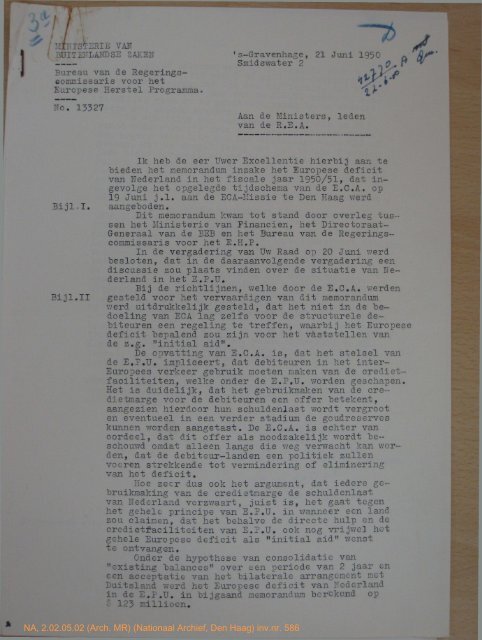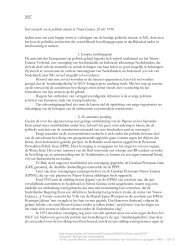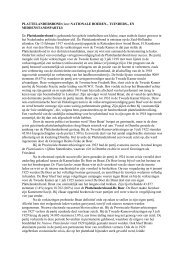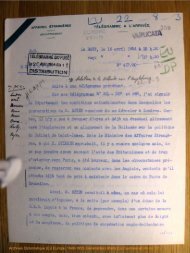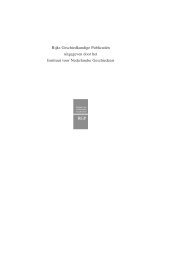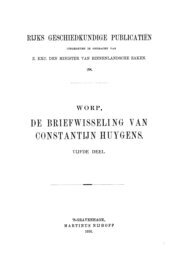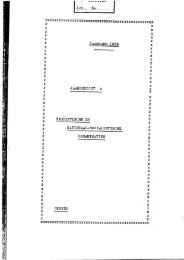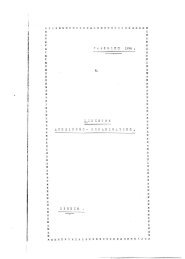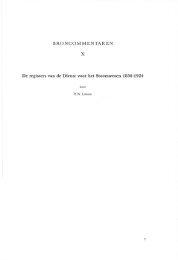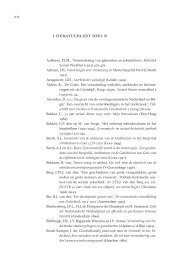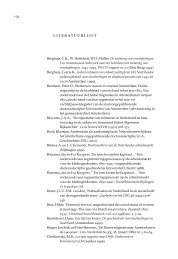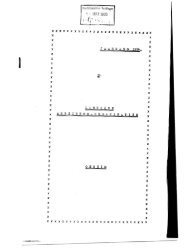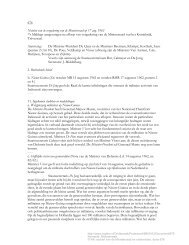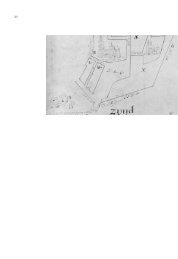MINISTERIE VAN BUIT EITL AMD SE ZAKEN Bureau ... - Historici.nl
MINISTERIE VAN BUIT EITL AMD SE ZAKEN Bureau ... - Historici.nl
MINISTERIE VAN BUIT EITL AMD SE ZAKEN Bureau ... - Historici.nl
Create successful ePaper yourself
Turn your PDF publications into a flip-book with our unique Google optimized e-Paper software.
<strong>MINISTERIE</strong> <strong>VAN</strong><br />
<strong>BUIT</strong> <strong>EITL</strong> <strong>AMD</strong> <strong>SE</strong> <strong>ZAKEN</strong><br />
<strong>Bureau</strong> van de Regeringscommissaris<br />
voor het<br />
Europese Herstel Programma,<br />
No. 13327<br />
's-Gravenhage, 21 Juni 1950 a<br />
Smidswater 2 «Q„ V •<br />
Aan de Ministers, leden<br />
van de R.E.A.<br />
Ik he"b de eer Uwer Excellentie hierbij aan te<br />
bieden het memorandum inzake het Europese deficit<br />
van Nederland in het fiscale jaar 1950/51, dat ingevolge<br />
het opgelegde tijdschema van de E.C.A. op<br />
19 Juni j.1. aan de ECA-Missie te Den Haag werd<br />
B i j l , I . aangeboden.<br />
Bit memorandum kwam tot stand door overleg tussen<br />
het Ministerie van Financien, het Directoraat-<br />
Generaal van de BEB en het <strong>Bureau</strong> van de Regeringscommissaris<br />
voor het E.H.P.<br />
In de vergadering van Uw Raad op 20 Juni werd<br />
besloten, dat in de daaraanvolgende vergadering een<br />
discussie zou plaats vinden over de situatie van Nederland<br />
in het E.P.U.<br />
Bij de richtlijnen, welke door de E.C.A. werden<br />
Bijl.II gesteld voor het vervaardigen van dit memorandum<br />
werd uitdrukkelijk gesteld, dat het niet in de bedoeling<br />
van ECA lag zelfs voor de structurele debiteuren<br />
een regeling te treffen, waarbij het Europese<br />
deficit bepalend zou zijn voor het vaststellen van<br />
de z.g. " i n i t i a l aid".<br />
De opvatting van E.C.A. is, dat het stelsel van<br />
de E f P.U. impliceert, dat debiteuren in het inter-<br />
Europees verkeer gebruik moeten maken van de crediet -<br />
faoiliteiten, welke onder de E.P.U. worden geschapen.<br />
Het is duidelijk, dat het gebruikmaken van de eredietmarge<br />
voor de debiteuren een offer betekent,<br />
aangezien hierdoor hun schulde<strong>nl</strong>ast wordt vergroot<br />
en eventueel in een verder stadium de goudreserves<br />
kunnen worden aangetast. De E.C.A. is echter van<br />
oordeel, dat dit offer als noodzakelijk wordt beschouwd<br />
omdat alleen langs die weg verwacht kan worden,<br />
dat de debiteur-landen een politiek zullen<br />
voeren strekkende tot vermindering of eliminering<br />
van het deficit.<br />
Hoe zeer dus ook het argument, dat iedere gebruikmaking<br />
van de eredietmarge de schulde<strong>nl</strong>ast<br />
van Nederland verzwaart, juist is, het gaat tegen<br />
het gehele principe van E.P.U. in wanneer een land<br />
zou claimen, dat het behalve de directe hulp en de<br />
credietfacilitciten van E.P.U. ook nog vrijwel het<br />
gehele Europese deficit als " i n i t i a l aid" wenst<br />
te<br />
ontvangen.<br />
Onder de hypothese van consolidatie van<br />
"existing balances" over een periode van 2 jaar en<br />
een acceptatie van het bilaterale arrangement met<br />
Duitsland werd het Europese deficit van Nederland<br />
in de E.P.U. in bijgaand memorandum bcr'ckond op<br />
' 123 milliocn.<br />
NA, 2.02.05.02 (Arch. MR) (Nationaal Archief, Den Haag) inv.nr. 586
Op grond hiervan werd de dezerzijds zeer hoog<br />
geachte initial aid van $ 90 millioen gevraagd onder<br />
de argumentering, dat dit zou impliceren, dat Nederland<br />
in het eerste jaar van de E.P.U. reeds in aanzie<strong>nl</strong>ijke<br />
mate op de goudvrije swing in de crediotmarge<br />
zou moeten trekken.<br />
De schatting van het Europese deficit in "bijgaand<br />
memorandum is naar onze mening conservatief.<br />
Een hogere schatting zou het doorslaggevende nadeel<br />
hebben, dat in vergelijking met het vorige fiscale<br />
jaar ieder perspectief uit de Nederlandse betalingsbalans<br />
zou zijn verdwenen. De in vergelijking met de<br />
ramingen opvallend gunstige resultaten van het afgelopen<br />
jaar zijn zowel uit de Deviezcnnota als<br />
uit het jaarverslag van de Nederlandse Bank publiek<br />
bekend.<br />
Omtrent de beide veronderstellingen over de<br />
consolidatie en het accepteren van het Duitse arrangement<br />
staat op dit moment nog niets vast. Mochten<br />
één of "beide veronderstellingen te optimistisch blijken,<br />
dan kan dit in de volgende besprekingen over het<br />
memorandum kracht "bijzetten aan het verzoek om een<br />
initial aid van relatief grote omvang. Het leek in<br />
de onderhandelingen juister om een eventuele uitspraak<br />
over de onmogelijkheid van Nederland om de<br />
liberalisatie-maatregelen te handhaven of verder<br />
door te voeren, te bewaren totdat de eerste reacties<br />
op het memorandum van Amerikaanse zijde zijn gegeven.<br />
In de thans te voeren besprekingen zal zeker<br />
krachtig naar voren moeten worden gebracht, dat iedere<br />
trekking op de credictmarge, welke Nederland in de<br />
E.P.U. ter beschikking staat, een ernstig offer betekent,<br />
2' G z i c n de zware schulde<strong>nl</strong>ast, waaronder Nederland<br />
reeds gebukt gaat.<br />
Het ligt in do bedoeling, dat Uwe Excellentie<br />
voor de E..E.A. van a.s. Dinsdag ook een nota zal<br />
bereiken over andere aspecten van de Nederlandse positie<br />
in de EPU.<br />
De Wnd .-Regeringscommissaris<br />
voor deze<br />
De Directeur van het <strong>Bureau</strong><br />
voor het EuroDqse Herstel Programma<br />
Drs^E<br />
ï< £<br />
der Beugel).<br />
3-y3-
M B IJ OB i jf 33 U<br />
Mi<br />
The, jlejiie r I and in t ra-Buropean pay me nt s g|Q s it ion •<br />
O.S.K. liac requested to give a forecast of the Europ&f^<br />
payments position with the participating c&untrigM-'%^-'%^^^>l.<br />
Given the fact that the liberalization has been carried<br />
through to a considerable extent, i t is impracticable to<br />
give a rather exact prognosis, in contrast to previous years<br />
when exports and imports were controlled by quota systems.<br />
Therefore the prognosis had to be limited to an estimate of<br />
the overall balance the break down of which was estimated<br />
for the most important areas o<strong>nl</strong>y, ks a matter of fact these<br />
break down figures may interchange as a result of switches*<br />
3xpectations for 1950/ 51 sre as follows:<br />
(unit: one million dollar)<br />
Balanc e<br />
0 ontr ac t ual<br />
current<br />
oblications<br />
account on capital<br />
(tr ad e and<br />
account<br />
invisibles)<br />
a) Sterling area +14 - 7<br />
b) Belgium - 118 - 19<br />
c) Germany - 2 6 —<br />
d) Other participating<br />
c o i intrie a + 13 - 14<br />
- 117 - 40<br />
- 40<br />
- 157<br />
mi--. Lie above figures do not include the existing balances<br />
per July 1st, 1950, as the manner of consolidating these<br />
balances has not yet been determined. These balances are:<br />
(Unit: one million<br />
dollar)<br />
Whan taxing When no a,<br />
inte account taxing into<br />
J- '<br />
the amre e men t acc o un"G uiie<br />
with Germany 1 ) agreement<br />
with Germany<br />
? )<br />
Sterling area { ~ ¿4 c - ¿4<br />
- 40 . - 40<br />
Germany -g^vv, / v + 41 (87-45) . * 37<br />
Other participating<br />
countries < —<br />
Total balance. _ m + ?2<br />
Note ') In accordance with s bilateral agreement v/i-feh. Oaymany<br />
separate a^ooni to £<br />
chases in 1950/51•<br />
NA, 2.02.05.02 (Arch. MR) (Nationaal Archief, Den Haag) inv.nr. 586
If: l) the existing balances will be consolidated within<br />
2 years and<br />
2) the "bilateral agreement with Germany is taken into<br />
account<br />
the estimated overall deficit for 1350, 51 of , 157 will be<br />
reduced by i 34 to , 125•<br />
The amount of 34 has been calculated as follows:<br />
o<br />
decrease by , 46 on account of the bilateral agreement with<br />
Germany;<br />
increase by ,', 12 (half of the existing balance of minus 23)<br />
Net decrease: s 34«<br />
Should the bilateral agreement with Germany prove not to<br />
be consistent with the Z'^P.U. , the existing balances per<br />
July 1st, 1950 would not be - :. 23 but + . 23, and the estimated<br />
deficit for 1950/51 would have to be reduced by about<br />
; 12 to ( 145« ^ —<br />
of<br />
The figure , 12 represents half of the existing balance<br />
-f ,. 23 •<br />
explanation of the expected surpluses and deficits in the<br />
balance of payments 1950/51.<br />
The 1950/51 programme submitted! in Paris in December<br />
134 9 showed a balance with participating countries of +<br />
,. 11 y calculated on the basis of direct aid amounting to<br />
balance with participating Sterling area<br />
(U.K. and D.O.T.) 4- . 84<br />
balance with other participating countries<br />
( . 15 of which to be paid in Sterling) - 75<br />
The other Sterling-transactions at the time had been estimated<br />
to bejlj;<br />
^-transactions with participating countries<br />
(excluding T J.Z. and D.O.T) - ;"• 15<br />
^-transactions with "Western Hemisphere - , 34<br />
--transactions with the lion Participating<br />
Sterling area - 35<br />
8 4<br />
The above shows that in .December 1949 an equilibrium was<br />
expected in .".-transactions, as considered from the ourrencyand<br />
not from the geographical area angle,whereas the<br />
transactions with the Participating and Non-Participating<br />
Sterling area were estimated to result in a suralus of +<br />
. 84 - :. 55 rr + .. 49*<br />
"Then calculating the balance of the Participating Sterling<br />
area as * ] 34 ^nd the balance of the other Participating<br />
Countries as - =. 73 in the programme submitted in December<br />
1949 the starting point hacf bc-Cn a liberalisation percentage<br />
which was lower than the present "ocrcentage •<br />
NA, 2.02.05.02 (Arch. MR) (Nationaal Archief, Den Haag) inv.nr. 586
Furthermore the consequences of liberalization have beer<br />
found to be much more onesided than had been expected at the<br />
time, faking into consideration the probable cut in direct<br />
aid, these factors will not fail to exercise their influence<br />
upon the Netherlands position with the other Participating<br />
Countries in 1950/51*<br />
Re a: The ^-earning capacity in the Participating Sterling<br />
area has been reduced by the above mentioned factors<br />
and is now estimated to be + , 75. On the other hand<br />
ci-payments are not expected to recur in relation v/ith<br />
other Participating Countries under the system of the<br />
3.P.U., but they will certai<strong>nl</strong>y recur in the current<br />
payments with the Non-Participating Sterling area, the<br />
Y/estern Hemisphere and also other Non~Participating<br />
Countries. The Sterling position will then be expected<br />
to be as follows:<br />
Balance of receipts and payments with the<br />
Participating Sterling area 4 v 76 2)<br />
.Balance of receipts and payments with the<br />
Non-Participating Sterling area, the<br />
Western Hemisphere and other Non-<br />
Part ici ID a tins Countries - a 69<br />
2) Note: including capital account.<br />
+ 0 7<br />
Eg b: A. prognosis on the development of the monetary account<br />
with Belgium has become exEedingly difficult since the<br />
liberalisation. The above factors appear to make their<br />
influence felt particularly with regard to Belgium.<br />
The liberalization percentage vis-a-vis Belgium is<br />
considerably higher than the percentage vis-*-vis the<br />
other Participating Countries,whereas the market in<br />
the Netherlands has not yet been saturated in certain<br />
sections in contrast to a. saturated Belgium market.<br />
In a relative sense the Belgian market therefore has<br />
offered practically no additional possibilities as yet<br />
to the" : -^^^«i^#$,S^^^;-Hietfe#riand.s export s. O<strong>nl</strong>y aft er the<br />
prospective coordination of the Netherlands and Belgian<br />
. g r i c u l t , the • section may be expected<br />
to offer perspectives to Netherlands exports.<br />
The consequences of liberalization in the trade v/ith<br />
Belgium have proved to be much more far-reaching than<br />
had first been anticipated. The deficit of the first<br />
four months of 1950 amounting to about 30 million dollar<br />
can not be taken as a basis for calculating an annual<br />
deficit, given the fact that seasonal influences play<br />
an important p-:rt in the first four months of every year<br />
and taking into account the considerable pressure on the<br />
balance of payments, resulting from the backlog demand<br />
in the Netherlands, which is of a declining nature•<br />
In spite of the fact t f t ^ t " ^ ^ ^ ^ . ^ ^ ^ t e i f ^ f c<br />
months of 1950 is not symptomatic, it shows the heavy<br />
strain on the Netherlands balance of payments caused<br />
by liberalization.<br />
In view of these factors the deficit on the current<br />
account of the 1950/51 balance of payments may be<br />
estimated to amount to about 118 million.<br />
NA, 2.02.05.02 (Arch. MR) (Nationaal Archief, Den Haag) inv.nr. 586
When adding to this figure tlie deficit on capital account<br />
the total deficit would be about : 137 Billion* When<br />
comparing this deficit with the 1949/50 deficit v;hich<br />
will amount to about , 152 million, an idprovesient in<br />
the position with Belgium, appears to he expected nowithstanding<br />
the great progress in liberalization.<br />
Re c: 4 deficit of about 26 million is to be expected with<br />
Germany in 1950/51, due to a great extension of the<br />
liberalization of imports tTom Germany,reBurning<br />
tourist-traffic to Germany and the recently imposed<br />
restrictions on the transit-trade to Germany.<br />
This is a l l the more probable as Hetherlands exports<br />
cf consumer-goods are as a rule paid for immediately,<br />
whereas Netherlands purchases of German capital goods<br />
will affect the balance of payments in a later stage.<br />
lie jdU ^n equilibrium will be expected to exist with the other<br />
countries.<br />
Whereas an equilibrium will be likely to exist with<br />
Sweden,surpluses may be expected in the balances of<br />
payments with llorway and Denmark,<br />
The balance of payments with f'ranoe is developing from<br />
an equilibrium into a relatively small deficit,whereas<br />
the balances with the remaining countries will probably<br />
show a surplus.<br />
k prognosis for the balance of payments with Switzerland<br />
is hardly to make on account of the special nature of<br />
the goods to be imported from that country. Nevertheless<br />
it is taken into account that the position with Switzerland<br />
will alter from an artificial equilibrium into a<br />
deficit.<br />
rissuming that after the establishment of the "E... .U.<br />
further liberalization will be carried through, it is<br />
#lfSiei 3-i^ely $ however, that an overall surplus on the<br />
current account of about 13 million can be achieved<br />
fhe deficit on the ergi tal account with ti<br />
will be about 14 million, so that the overall b;lance<br />
will show .:. deficit of about 1 million.<br />
Whe n t ak ing into a ceo ajgftj "'.^fife* - also ve estimates, a deficit<br />
with the dollar area of . 175 mil.Lion and a surlus with the<br />
rest of the world 5 million, the total balance of payments<br />
will give the following picture:<br />
Dollar area ÉsÈt ( - 175 gld. - 655<br />
Participating Countries • gld « ~ 600-"<br />
Other countries + 5 .'Id. +_ 20<br />
327 gld. -1245<br />
i»— mm<br />
4f ter t ak ing ' lato; iae.COUpfe tlie devaluation which took<br />
place in the meantime, the estimate of the gross deficit on<br />
the 1949/5C-balance of $$mnt& ainounteö to about Gld.1500 miÄ<br />
lion, fhe smaller deficit'of Gld. 1000 million for the calendar<br />
year 1949, as shown by the realization figures, has been ï><br />
vourably influenced by a number of exceptional factors in the sœad.<br />
NA, 2.02.05.02 (Arch. MR) (Nationaal Archief, Den Haag) inv.nr. 586
half of 1949? which can not be reckoned with when making the<br />
estimate for 1950/51? partly as these factors are absolutely<br />
uncertain, partly as they are certain not to recur,<br />
These factors are «<br />
a) the drought in 1949 in Western Europe, which entailed extra<br />
export-possibilities in the Netherlands agricultural section<br />
b) temporary onesided liberalization of. the Netherlands imports<br />
into Western Germany;<br />
c) the improvement in the trade e.nd payments with Indonesia 9<br />
which cannot be expected to continue\<br />
d) in the last quarter of 1943 the current account of the<br />
balance of payments with the participating countries showed<br />
a surplus, an abnormal phenomenon, which can be explained<br />
by the fact that the buyers in this country in view of<br />
devaluation? have been abiding the development of prices<br />
on the worldmarket, in the meantime eating into their<br />
stocks.<br />
She favourable influence of these factors is estimated to<br />
amount to Gld« 50C to 400 million :nd elimination of these<br />
factors would bring the 1949 deficit up to about &!&• 1550<br />
million* Ihe 1950/51 estimate of GlcL 1245 million, therefore 0<br />
essentially means an improvement of about G-ld. 100 million as<br />
against 1949«<br />
Taking a deficit in the 3.P.U. of & 123 million as a starting<br />
point, thus presuming that<br />
a) the existing balances will be consolidated within two years<br />
b) the bilateral agreement with Germany will materialise 5<br />
i t seems reasonable to suggest to 0«S*m to consider an amount<br />
of IQ million to cove; the i n i t i a l position, having regard<br />
to the fact that this deficit will result from 1<br />
1) the liberalization of trades<br />
2) the increased strain on the balance of payments with the<br />
participating countries consequent upon a considerable cut<br />
in the direct aid.<br />
If an i n i t i a l position of i 90 million should be granted,<br />
about half of the credit margin not requiring settlement in<br />
gold or dollars would be exhausted in the first year,<br />
-jxhausting a much larger portion of the E.P.u.--credit margin<br />
in ftie first year, would in the opinion of the Netherlands<br />
Government; entail certain risks; not o<strong>nl</strong>y because the ad -<br />
vantage of the German agreement would no longer exist in<br />
1951/52, but also because the Netherlands hard currency re -<br />
serves have to be preserved as much as possible, especially<br />
in view of the fact that after June 1952 no more Marshall-aid<br />
will be forthcoming. Such reserves are indispensable to cover<br />
the obligations on the capital account and possibly also a<br />
deficit on the current account in later years.<br />
Ihe Netherlands Government, however, consider i t to be pose.ibl<br />
that the bilateral agreement with Germany will not be consistent<br />
with the system of the ^.J?.U. Consequently calculation<br />
should also be based upon a consolidation of the entire German<br />
balance p ;,r July 1st, 1950, within two years. : Ihis would mean<br />
NA, 2.02.05.02 (Arch. MR) (Nationaal Archief, Den Haag) inv.nr. 586
that the deficit in the E.P.U. v/ould not be £ 123 nillion but<br />
y 145 million.<br />
Should an i n i t i a l position of $ 90 million bo granted, the<br />
_ ortion of the credit margin not requiring settlement in gold<br />
or dollars would practically be exhausted entirely in<br />
first year<br />
o<br />
the<br />
in view of the above the- Netherlands Government , therefore<br />
applies for an allocation of s> 90 mill lea to cover their<br />
i n i t i a l position in the E.P.U.<br />
Regarding the prospects for 1950/51 and later years the<br />
following observations must be made. Should liberalization<br />
be applied integrally by the other 2uropean countries after •<br />
the establishment of the 1*P#U., p. gradual improvement may be<br />
expected to occur in the Netherlands position,, The strain<br />
on the capital account exerted by contractual engagements with<br />
the Participating Countries will then for the greater part<br />
have disappeared. Besides, the considerable disequilibrium<br />
in the balance of payments with Belgium, occasioned by the high<br />
de.r^e of liberelization in the trade with this country ~<br />
which is necessary with a view to the realiza/tion of the<br />
„'.nclux - 'will be reduced to more normal proportions, Iloreover<br />
the figures relating to the monetary developments end<br />
the gradual recession in consumption also indicate a similar<br />
improvement in the Netherlands Ion,;; term position*<br />
If moreover also the balance of payments with the other<br />
participating countries should gradually be showing an increasing<br />
surplus, the assumption appears to be warranted<br />
that toward the ma of the P..PL.P.-aid the Netherlands deficit<br />
in the overall x,uro._:ean bel ".nee of payments will have decreased<br />
considerably,<br />
Por 1951/52, however, z considerable deficit will s t i l l have<br />
to be reckoned with.<br />
NA, 2.02.05.02 (Arch. MR) (Nationaal Archief, Den Haag) inv.nr. 586
MEMORANDUM OP THE E.C.A.<br />
INTRODUCTION.<br />
1. Since the beginning of the discussions on a European<br />
Payments Union i t has been recognized that certain deficits<br />
of participating countries would be eligible for special<br />
financing after the establishment of the Payments Union. The<br />
Second Report of the O.E.E.C. referred to deficits which<br />
might be called "structural 1 1 or "exceptional" whose financing<br />
would be distinct from the ordinary credit facilities<br />
of the E.P.U., although probably administered within the<br />
E.P.U., and whose determination would be an E.C.A. responsi<br />
b i l i t y . The recent very encouraging progress toward final<br />
agreement on the Payments Union makes i t advisable to proceed<br />
at once to the determination nf such eligibility for special<br />
financing.<br />
2. The term "structural" has frequently been used in<br />
reference to the deficits in question; the terms "exceptional"<br />
and "permanent" have also been occasionally used. Each of<br />
these terms is capable of several interpretations; furthermore,<br />
i t has not heretofore been made clear whether a l l or<br />
o<strong>nl</strong>y some part of such deficits as might be considered<br />
"structural" would be covered by special financing. In view<br />
of the ambiguity of the terms "structural" and "exceptional"<br />
and the unsuitability of the term "permanent", we shall<br />
henceforth refer to the operations falling under this general<br />
heading as the establishment of i n i t i a l positions vis-a-vis<br />
the E.P.U.<br />
3. Although the exact method of accounting for such<br />
i n i t i a l positions is not yet finally determined, they will<br />
in general take the form of credits to the accounts of certain<br />
participating countries with the E.P.U. which may be used to<br />
settle net deficits with the E.P-rU. without gold settlement<br />
or repayment obligations.<br />
4. The special financing of surpluses will be the subject<br />
of separate discussion with the countries concerned*<br />
C-eneral<br />
Considerations.<br />
5. As a framework for considering the eligibility of a<br />
country for an i n i t i a l position in its favor vis-a-vis the<br />
H.P.U., the following considerations should be kept in mind.<br />
6. An i n i t i a l position in favor of a participating country<br />
represents intra-European aid on a grant basis. It must<br />
therefore be justified by special factors in the economic<br />
position of the country during the transitional period of<br />
post-war recovery and must be related to a program for the<br />
elimination of the need for extraordinary outside assistance<br />
by or before the end of the E.R.P. period.<br />
NA, 2.02.05.02 (Arch. MR) (Nationaal Archief, Den Haag) inv.nr. 586
7. It is not the intention of the B.C.A. to arrange<br />
special financing via Initial positions for all forecast<br />
intra-European deficits. The ordinary credit facilities of<br />
the E.P.U. are themselves expected to provide a large measure<br />
of flexibility in the payments positions of its members; and<br />
it i S Goo ential to recognize the credits provided by the<br />
E.P.U., accompanied by gold payments on the schedules to be<br />
agreed, as the normal method for financing the deficits which<br />
occur. Thus, while the development of an estimate of a country's<br />
intra-European payments position is a necessary part of<br />
the analysis of that country's eligibility, the establishment<br />
of an Initial position must rest on something more than a<br />
forecast deficit.<br />
8. Just as the initial positions are not designed to<br />
replace the facilities of the E.P.U., they are similarly not<br />
designed to postpone or ohiate stops towards economic readjustment<br />
which may be essentia? to the ultimate balancing<br />
"of a country's payments.<br />
9. It is important to recognize that the complete intra-<br />
European transferability of all intra-European earnings and<br />
of E.P.U. credits will alleviate many of the most intractable<br />
payments problems which have given ri3e to drawing rights<br />
under the present or post Intra-European Payments Agreements.<br />
Those drawing rights have largely been designed to cover particular<br />
bilateral payments deficits. Any prospective deficit<br />
whose financing through an initial position is under consideration<br />
must consequently be an overall deficit in Europe.<br />
10. In view of the foregoing considerations it will be<br />
clear that there i3 no necessary relationship between the<br />
initial positions established in favour of certain countries<br />
and the drawing rights which have been established in the past.<br />
The fact that a country has received drawing rights during<br />
the la3t two years would not in itself justify the establishment<br />
of an initial position with E.P.U. At the same time, it<br />
is clear that a country receiving an initial position in its<br />
favour with E.P.U. should snow substantial progress toward<br />
equilibrium by comparison with the previous years#<br />
PROCZLVJiZ FOB Dgg SBATIO<br />
. Og INITIAL POSITIONS.<br />
11. "Tith governments that feel there are special facto rs in<br />
their intra-European payments which, in vie 1 // of the consl<br />
ations outlined above, would justify initial positions in their<br />
favour, the O.S.R. will hold individual discussions in Pa<br />
during the few days beginning 22nd June. As a basis for t<br />
discussions the O.S.R. would wish to receive, from the do<br />
ation of each such government, a memorandum by 19th June.<br />
12. The memorandum should include:<br />
a) an estimate of the country 1 .~ intra-European pay<br />
fashion, for the following year, taking into ac<br />
-anticipated -<br />
NA, 2.02.05.02 (Arch. MR) (Nationaal Archief, Den Haag) inv.nr. 586
anticipated trade liberalisation as well as other<br />
relevant factors. This estimate should be presented<br />
in the context of a continuing development" toward<br />
independence of outside aid by 1952 and should indicate<br />
the particular elements whose improvement<br />
by 1952 will lead to overall balance.<br />
b) special elements which reflect particular government<br />
programmes;<br />
c) particular elements of uncertainty in payments or<br />
receipts;<br />
d) the structure of intra—European debts owed by or<br />
owed to the country 9particularly the debts that<br />
have not been consolidated.<br />
13• Finally ? the memorandum should state the size of the<br />
initial po sit ion that the government wishe s the E.C.k. to<br />
consider ? and should set forth explicitly those factors that,<br />
in the 3udgement 0f the government, may make the coantry eligible<br />
to receive intra-European aid on a grant basis after<br />
the institution of the European Payments Union*<br />
14. The E.G.A. Missions may, in the course of their<br />
consultation with the governments, suggest additional points<br />
relevant to the memoranda of particular countries.<br />
15. At the time of the individual discussion with a country<br />
delegation the corre spending E.G.A. Mission will be represented<br />
in Paris to take part. It is hoped that the memorandum to<br />
be submitted to 0.S.R. by 19th June will be prepared in close<br />
consultation with the E.G. A.Mission; the O.S.R. will rely<br />
heaviliy on the Mission for technical analysis and recommendation.<br />
In particularj any parts of the memorandum which<br />
require detailed analysis should be discussed sufficiently<br />
with the Mission to avoid time-consuming examination of<br />
details in the Paris discussion. In any event ? a copy of thecountry's<br />
memorandum should be transmitted to the E.G.A.<br />
Mission by the time of tis transmittal to O.S.R*<br />
-0-0-0-<br />
3-4:53-60- 6- 1 50<br />
NA, 2.02.05.02 (Arch. MR) (Nationaal Archief, Den Haag) inv.nr. 586


